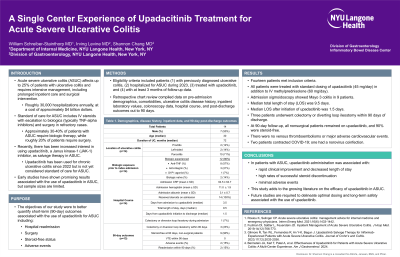Tuesday Poster Session
Category: IBD
P4332 - A Single Center Experience of Upadacitinib Treatment for Acute Severe Ulcerative Colitis
Tuesday, October 29, 2024
10:30 AM - 4:00 PM ET
Location: Exhibit Hall E

Has Audio
- WS
William Schreiber-Stainthorp, MD
NYU Langone Health
New York, NY
Presenting Author(s)
William Schreiber-Stainthorp, MD1, Irving Levine, MD1, Shannon Chang, MD2
1NYU Langone Health, New York, NY; 2New York University Langone Health, New York, NY
Introduction: Acute severe ulcerative colitis (ASUC) affects many patients with ulcerative colitis and requires intensive management, including prolonged inpatient care and surgical intervention. Standard of care for ASUC includes IV steroids with escalation to biologics and surgery in refractory cases. Recently, there has been increased interest in using upadacitinib, a Janus kinase 1 inhibitor, as salvage therapy in ASUC. While early studies have shown promising results, sample sizes are limited. Given these encouraging early findings, we studied the use of upadactinib for ASUC at our own institution, tracking patient outcomes including need for surgery, steroid-free remission, and adverse medication events.
Methods: Patients hospitalized for ASUC flares and started on upadacitinib during 2023 were eligible for inclusion. Retrospective chart review was used to compile data on pre-admission demographics, comorbidities, ulcerative colitis disease history, inpatient laboratory values, colonoscopy data, hospital course, and post-discharge outcomes at 90 days.
Results: Fourteen patients met inclusion criteria, 50% of whom were male, with a median age of 30 years.
Mean admission hemoglobin was 11.0 g/dl, albumin 3.1 g/dl, CRP 64.5 mg/L and fecal calprotectin 1981 μg/g. Admission sigmoidoscopy showed Mayo 3 colitis in 9 patients. All patients were treated with standard dosing of upadacitinib (45mg/day) in addition to IV methylprednisolone (60mg/day). Median total length of stay (LOS) was 9.5 days, with 3 patients undergoing colectomy or diverting loop ileostomy within 90 days of discharge. Median LOS after initiation of upadacitinib was 1.5 days. At 90-day follow-up, all nonsurgical patients remained on upadacitinib and 90% were steroid-free. There were no venous thromboembolisms or major adverse cardiovascular events; 2 patients contracted COVID-19, one of whom also had norovirus.
Discussion: Upadacitinib in patients with ASUC was associated with rapid clinical improvement and high rates of successful steroid discontinuation, without a significant burden of adverse events. Rates of surgery were slightly higher than those documented in the literature on ASUC, but this likely reflects selection bias towards sicker, more refractory patients. While future studies are required to delineate optimal dosing and long-term safety of upadactinib, this study adds to the growing literature on its efficacy, not only for outpatient treatment of ulcerative colitis but for severe flares of disease requiring admission.
Note: The table for this abstract can be viewed in the ePoster Gallery section of the ACG 2024 ePoster Site or in The American Journal of Gastroenterology's abstract supplement issue, both of which will be available starting October 27, 2024.
Disclosures:
William Schreiber-Stainthorp, MD1, Irving Levine, MD1, Shannon Chang, MD2. P4332 - A Single Center Experience of Upadacitinib Treatment for Acute Severe Ulcerative Colitis, ACG 2024 Annual Scientific Meeting Abstracts. Philadelphia, PA: American College of Gastroenterology.
1NYU Langone Health, New York, NY; 2New York University Langone Health, New York, NY
Introduction: Acute severe ulcerative colitis (ASUC) affects many patients with ulcerative colitis and requires intensive management, including prolonged inpatient care and surgical intervention. Standard of care for ASUC includes IV steroids with escalation to biologics and surgery in refractory cases. Recently, there has been increased interest in using upadacitinib, a Janus kinase 1 inhibitor, as salvage therapy in ASUC. While early studies have shown promising results, sample sizes are limited. Given these encouraging early findings, we studied the use of upadactinib for ASUC at our own institution, tracking patient outcomes including need for surgery, steroid-free remission, and adverse medication events.
Methods: Patients hospitalized for ASUC flares and started on upadacitinib during 2023 were eligible for inclusion. Retrospective chart review was used to compile data on pre-admission demographics, comorbidities, ulcerative colitis disease history, inpatient laboratory values, colonoscopy data, hospital course, and post-discharge outcomes at 90 days.
Results: Fourteen patients met inclusion criteria, 50% of whom were male, with a median age of 30 years.
Mean admission hemoglobin was 11.0 g/dl, albumin 3.1 g/dl, CRP 64.5 mg/L and fecal calprotectin 1981 μg/g. Admission sigmoidoscopy showed Mayo 3 colitis in 9 patients. All patients were treated with standard dosing of upadacitinib (45mg/day) in addition to IV methylprednisolone (60mg/day). Median total length of stay (LOS) was 9.5 days, with 3 patients undergoing colectomy or diverting loop ileostomy within 90 days of discharge. Median LOS after initiation of upadacitinib was 1.5 days. At 90-day follow-up, all nonsurgical patients remained on upadacitinib and 90% were steroid-free. There were no venous thromboembolisms or major adverse cardiovascular events; 2 patients contracted COVID-19, one of whom also had norovirus.
Discussion: Upadacitinib in patients with ASUC was associated with rapid clinical improvement and high rates of successful steroid discontinuation, without a significant burden of adverse events. Rates of surgery were slightly higher than those documented in the literature on ASUC, but this likely reflects selection bias towards sicker, more refractory patients. While future studies are required to delineate optimal dosing and long-term safety of upadactinib, this study adds to the growing literature on its efficacy, not only for outpatient treatment of ulcerative colitis but for severe flares of disease requiring admission.
Note: The table for this abstract can be viewed in the ePoster Gallery section of the ACG 2024 ePoster Site or in The American Journal of Gastroenterology's abstract supplement issue, both of which will be available starting October 27, 2024.
Disclosures:
William Schreiber-Stainthorp indicated no relevant financial relationships.
Irving Levine indicated no relevant financial relationships.
Shannon Chang: AbbVie – Consultant. Bristol Myers Squibb – Consultant. Janssen – Consultant. Pfizer – Consultant.
William Schreiber-Stainthorp, MD1, Irving Levine, MD1, Shannon Chang, MD2. P4332 - A Single Center Experience of Upadacitinib Treatment for Acute Severe Ulcerative Colitis, ACG 2024 Annual Scientific Meeting Abstracts. Philadelphia, PA: American College of Gastroenterology.
